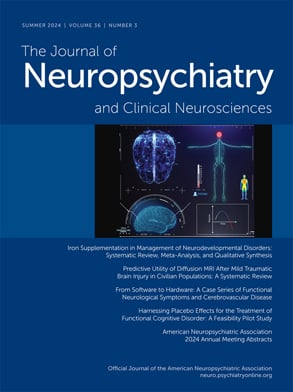SIR: We read with great interest the recent article of Hwang et al.
1 in which the clinical and neuropsychiatric features of schizophrenic subjects with severe and persistent obsessive-compulsive (OC) symptoms were investigated. The findings of this study replicated a known fact that OC-schizophrenia patients have a worse clinical course, showing poor treatment response and greater impairment of functioning.
2 The authors also revealed that OC-schizophrenia patients showed an atypical set of clinical and neuropsychological characteristics, consisting of a higher level of negative symptoms, worse overall psychopathology, and significantly more impaired performance on the Wisconsin Card Sorting Test, raising a possibility of greater prefrontal pathology.
1 Schizophrenia with concurrent OC symptoms is of great interest. The etiology of OC phenomena in schizophrenia remains unclear. There is significant overlap of the proposed functional circuits and dysfunction at the neurotransmitter level between OCD and schizophrenia, which may lead to co-expression of symptoms. The interactions are multiple and complex, especially in regard to the serotonin and dopamine systems.
3 Today controversy centers on whether there is a continuum or overlap in psychopathology between these entities that some authors have called “schizo-obsessive disorder.”
4 Within this type, several clinically discrete groups were described: OCD patients who become psychotic; schizophrenic patients with comorbid OCD; schizophrenic patients exhibiting OC symptoms; and patients with comorbid OCD and schizotypal personality disorder.
5 Existence of these groups may explain the diversity in epidemiological data, clinical manifestations and course, outcomes of various treatments, and prognosis.
5OCD in schizophrenic patients, at least in the early stages of the disease, may have a “protective” effect regarding some psychotic symptoms and may be responsible for a less virulent course of illness and a higher level of functioning.
6 On the other hand, patients with “OC schizophrenia” tended to have a more chronic course, a greater frequency of social and occupational impairment, and a poor long-term outcome.
1,2,6 Treatment with serotonin reuptake blockers, added to the neuroleptic, was found to be efficacious in the treatment of obsessions and compulsions and to improve overall schizophrenic symptoms.
7Most recently Berman at al.,
8 using neurocognitive testing, pointed out the lack of correlation between OC and positive and negative symptomatology in schizophrenia and concluded that OC symptoms may constitute a distinct cluster, separate from psychosis, in schizophrenia and may possibly indicate a distinct subtype of schizophrenia. Their report underscores the importance of the findings of Hwang et al.,
1 which support this point of view, and gives an additional strong clinical-neuropsychological complement to establishing the borders of a new diagnostic entity within the OCD-schizophrenia spectrum category. This very interesting area warrants more systematic studies to delve into this question further.

